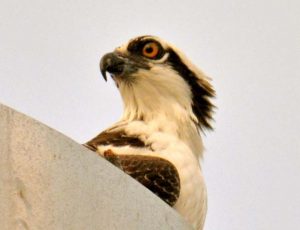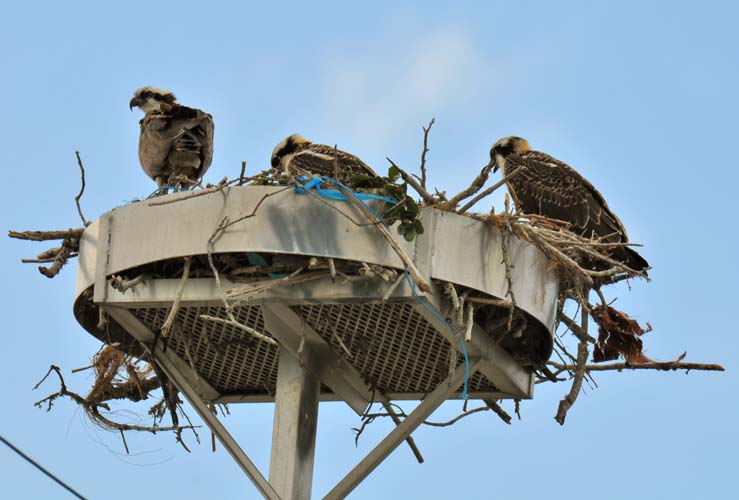It doesn’t take much to ruffle feathers in Melbourne Beach. The town government is notorious for protracted debate over seemingly inconsequential matters that blow up into major controversies. This time, it’s ospreys. And a web cam.
The ospreys nesting atop a power line pole along Riverside Drive in Melbourne Beach seemed quite content despite the rain pouring down on July 19. After all, this was home.

“They are wonderful to watch nesting. But I don’t understand why you would fix what is not broke. We are happy with way things are,” Collins told commissioners at the meeting that night.
Last July, the commission directed Town Manager Tim Day to look into the cost and feasibility of installing a camera on a pole at Riverside and Avenue B to view an osprey nest. Day contacted Florida Power & Light, which agreed to install the pole at no cost to the taxpayers. The only expense would be for the camera and its installation.
Good idea. Too little thought?
Added Patty James, “I love watching the birds. I think having it online is a great idea but in a public place not in a residential area.”
It’s not just about disrupting the birds, residents say. “Putting this in a private neighborhood with cameras is creepy and an invasion of our lives,” Collins said.
The outcry found a sympathetic ear.
“I like to watch them but if residents are uncomfortable I’d say no,” Vice Mayor Tom Davis said.
Commissioner Steve Walters said, “If we move the one we have now, the ospreys may not come back.”
True enough, Collins said. “I worked very hard for two years to get FPL to put a correct nesting box on the pole after the electrocution of ospreys.”
The pole now includes spikes to keep the ospreys from touching the live wires.
“We successfully had two seasons of babies since the new nest was installed,” Collins said. “The way I understood the town’s proposal, the entire nest would have been relocated to a lower pole in the same vicinity. Ospreys mate for life and return to the same nest each mating season. If they move the nest there is a chance the osprey will try and use their original FPL pole and be electrocuted again.”
Or it may take several years to attract osprey to the new nest.
“I thought it was a great idea when first proposed,” Mayor Jim Simmons said of the plans.
“But we didn’t fully vet it. No one asked us for this. There may be better solutions we can explore rather than pushing this.”
Collins said the county contains hundreds of nests. “The park would be perfect down by the river for a new nest. Ospreys would eventually find the nest boxes and more people could enjoy the birds.”
The commission made a motion to discontinue the proposed video camera nest on the chosen site and referred a future site to the Environmental Advisory Board.
Video cam nests have proliferated in recent years as the technology has gotten less expensive. They tend to be organizational – run by conservation organizations who know how to do this compatibly with the birds so that they are not harmed. The website Explore.org gathers many of these wildlife cams in one spot, and features a picturesque osprey cam with crystal-clear picture and sound on Hog Island in Maine, operated by the Audubon Society.
According to Audubon Florida, well placed cameras should not harm osprey. Care must be taken to place them before birds arrive to nest. In the event they malfunction during nesting season, they must be left alone. Maintenance on them, close to the nest, can cause harm to the birds.
Ospreys are neither endangered or threatened but are protected under the federal Migratory Bird Treaty Act.
“Folks looking to post nest cameras should talk to the Florida Fish and Wildlife Conservation Commission to make sure they follow any permitting guidelines necessary,” said Julie Wraithmell, deputy director of Audubon Florida.
Proposed osprey cam causes flap with residents

